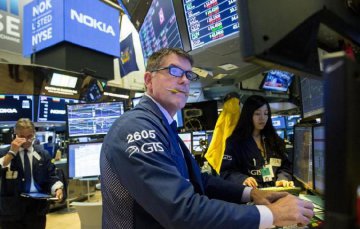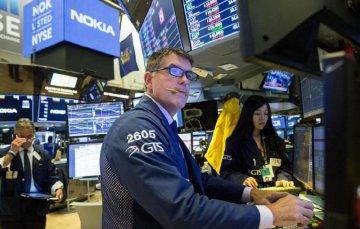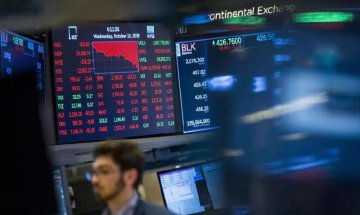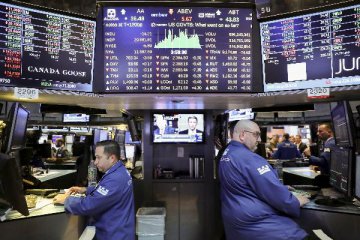U.S. stocks posted the worst weekly declines since March following two days of steep sell-off.
All three major indices, the Dow, the S&P 500 and the Nasdaq reported two-day declines of more than 5 percent on Wednesday and Thursday, sparked by higher rates and a sell-off in tech shares.
Despite the rebound on Friday, the Dow was down 4.2 percent for the week, the S&P 500 finished the week down by 4.1 percent, while the Nasdaq posted a 3.7 percent weekly loss.
The market was under pressure due to increasing concerns over rate hikes since the beginning of October.
The U.S. stock market was driven lower as expectations for the pace of higher U.S. interest rate hikes took effect, said Brendan Ahern, chief investment officer at Krane Funds Advisors, LLC, a U.S. asset management firm.
Treasury note yields had ticked up, hitting multiyear highs as they were boosted by strong economic data and comments from top Federal Reserve officials, indicating more interest hikes could be on the horizon.
While interest rates and bond yields could be a concern, investor sentiment clearly dragged the market downward.
Matthew Cheslock, a trader at Virtu Americas LLC, said Thursday's intraday volatility showed that people were unsure of what was going on, hence the panic.
"I think it's a valuation sell-off not a growth sell-off," said Amy Zhang, senior vice president and portfolio manager at Fred Alger Management.
She said people were spooked by the yield rise but it had nothing to do with the fundamentals as the selling was indiscriminating.
Zhang also noted that exchange-traded fund (ETF) and program trading aggravated the market slide.
On Friday, U.S. stocks rebounded as the fears over rising interest rates eased and earnings reports turned out to be better than expected. The Dow gained 1.15 percent, the S&P 500 was up 1.42 percent, and the Nasdaq increased 2.29 percent.
Strong earnings reports of bank shares helped lift the market. J.P. Morgan Chase, Wells Fargo and Citigroup all reported better-than-expected earnings.
Expectations for this earnings season are high. Third quarter earnings are expected to increase 21.5 percent from the same period last year and revenue is expected to increase 7.3 percent, according to the latest statistics released by Thomson Reuters.
However, experts noted that trade tension between the United States and China could overshadow the earnings season as companies are obliged to talk about what impact it brings to their businesses.
Friday's rebound was somewhat unconvincing to some analysts as they believed there would be further room for downside, although not necessarily a crash or crisis.
"The U.S. stock market is beginning to believe the United States is unlikely to come out of a trade war unscathed as lower global growth, as suggested by the IMF, would hurt U.S. multi-nationals," said Brendan Ahern, chief investment officer of Krane Funds Advisors, LLC.
The market was overbought, and signals including less liquidity from global central banks and trade tensions had been ignored for months, said Larry Benedict, CEO & founder of The Opportunistic Trader, a U.S. market research firm.
He added that the recent huge money flow from emerging economies to the U.S. market as a "safe haven" was dangerous.
According to Benedict, slower global growth, trade tensions and central banks' not easing could drive equities lower.
All three major indices, the Dow, the S&P 500 and the Nasdaq reported two-day declines of more than 5 percent on Wednesday and Thursday, sparked by higher rates and a sell-off in tech shares.
Despite the rebound on Friday, the Dow was down 4.2 percent for the week, the S&P 500 finished the week down by 4.1 percent, while the Nasdaq posted a 3.7 percent weekly loss.
The market was under pressure due to increasing concerns over rate hikes since the beginning of October.
The U.S. stock market was driven lower as expectations for the pace of higher U.S. interest rate hikes took effect, said Brendan Ahern, chief investment officer at Krane Funds Advisors, LLC, a U.S. asset management firm.
Treasury note yields had ticked up, hitting multiyear highs as they were boosted by strong economic data and comments from top Federal Reserve officials, indicating more interest hikes could be on the horizon.
While interest rates and bond yields could be a concern, investor sentiment clearly dragged the market downward.
Matthew Cheslock, a trader at Virtu Americas LLC, said Thursday's intraday volatility showed that people were unsure of what was going on, hence the panic.
"I think it's a valuation sell-off not a growth sell-off," said Amy Zhang, senior vice president and portfolio manager at Fred Alger Management.
She said people were spooked by the yield rise but it had nothing to do with the fundamentals as the selling was indiscriminating.
Zhang also noted that exchange-traded fund (ETF) and program trading aggravated the market slide.
On Friday, U.S. stocks rebounded as the fears over rising interest rates eased and earnings reports turned out to be better than expected. The Dow gained 1.15 percent, the S&P 500 was up 1.42 percent, and the Nasdaq increased 2.29 percent.
Strong earnings reports of bank shares helped lift the market. J.P. Morgan Chase, Wells Fargo and Citigroup all reported better-than-expected earnings.
Expectations for this earnings season are high. Third quarter earnings are expected to increase 21.5 percent from the same period last year and revenue is expected to increase 7.3 percent, according to the latest statistics released by Thomson Reuters.
However, experts noted that trade tension between the United States and China could overshadow the earnings season as companies are obliged to talk about what impact it brings to their businesses.
Friday's rebound was somewhat unconvincing to some analysts as they believed there would be further room for downside, although not necessarily a crash or crisis.
"The U.S. stock market is beginning to believe the United States is unlikely to come out of a trade war unscathed as lower global growth, as suggested by the IMF, would hurt U.S. multi-nationals," said Brendan Ahern, chief investment officer of Krane Funds Advisors, LLC.
The market was overbought, and signals including less liquidity from global central banks and trade tensions had been ignored for months, said Larry Benedict, CEO & founder of The Opportunistic Trader, a U.S. market research firm.
He added that the recent huge money flow from emerging economies to the U.S. market as a "safe haven" was dangerous.
According to Benedict, slower global growth, trade tensions and central banks' not easing could drive equities lower.
























Latest comments